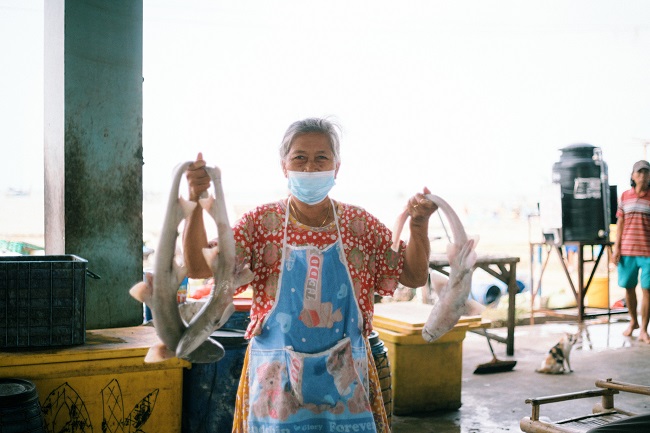Hutama Limarta
Wide open fields of paddies lined both sides of the narrow road. The rhythmic change of scenery between the spacious paddy fields and the dense sugarcane eventually ended at the entrance of a lush forested village.
I was welcomed by a gate more than six meters high that was cast with a symbol of a boat’s wheel and anchor, signifying that I was about to enter a fishing village. I had reached Banyutowo village.
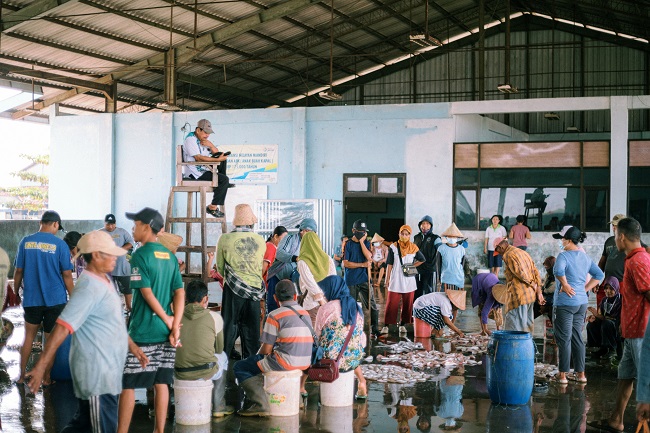
Located in Pati regency on the north coast of Central Java, the village occupies over 115,000 hectares and has over 3000 residents. The nearest town, Pati, is 37 kilometers away. That journey took me at least one hour. The name Banyutowo means ‘fresh water’ in Javanese, though every well in the village spouts out salty water. The level of saltiness goes down the further away from the sea you get.
I arrived late in the afternoon and headed straight for the local fish auction that is held daily at the port. The major fish trading takes place inside a big hall that locals call Tempat Pelelangan Ikan Banyutowo (Banyutowo Fish Auction House). The auction offers fresh catch from fishermen returning from sea with different kinds of fish, and shrimp of varying sizes. The auctioneer would shout the prices in Javanese, while buyers raised their hands to bid higher. This auction house is always crowded.
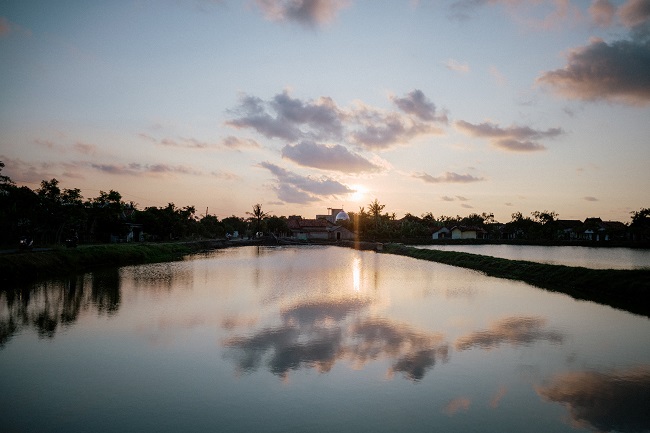
The port is the main local attraction for the villagers. It’s the spot where hawker food sellers and beautiful sunrises meet. There are sellers of sugarcane juice, roasted corn, cilok (tapioca dough in peanut sauce) and other delicious street snacks.
The port also attracts outsiders. I saw many young parents with children on motorbikes and teenagers with friends hanging out at the edge of the pier, around which there were no fences or safety features. The pier faces the eastern horizon making it the perfect place to enjoy the sunrise. After spending a night in a local villager’s house, I managed to get to the port at 5am, but it was cloudy that day so I have no beautiful picture of the Banyutowo sunrise.
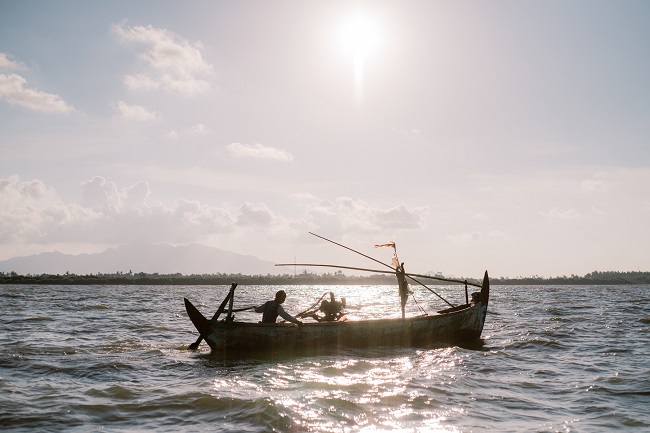
The Banyutowo port attracts sailors from the outer regions, as well as from nearby. ‘In some fishing seasons you can easily find fishermen from Jakarta here,’ said Utomo, 42, a local fisherman. This part of the Java Sea offers a better catch than Jakarta Bay. The fish are fresher and healthier in Banyutowo.
Utomo took me around the village. He explained what the port meant for people in the village, most of whom are from fishing families that rely on the sea as their main source of income. ‘I remember back when I was a kid, the fish were more varied than what we find these days,’ said Utomo. These days, he and other fishermen are looking for alternative sources of income, from the land. They believe that the sea won’t be able to provide what they need forever.
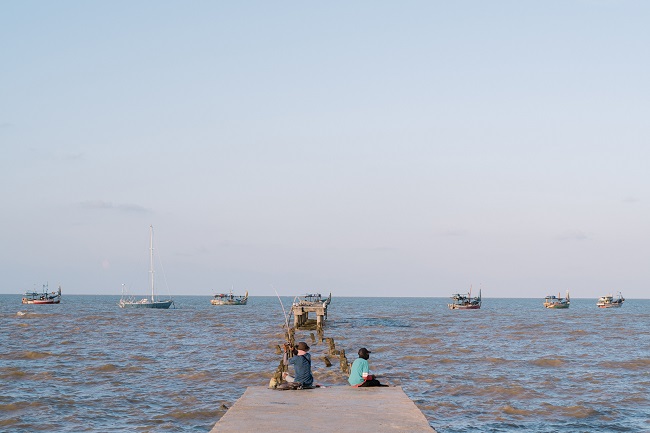
We roamed around the village on Utomo’s motorbike. He showed me where the fishermen hang out and what they do during the day when they are not out fishing. I saw many boats parked on the rivers, which connect directly to the sea. Some fishers were maintaining their equipment, mostly their fishing nets, while others just lay around, as if sunbathing.
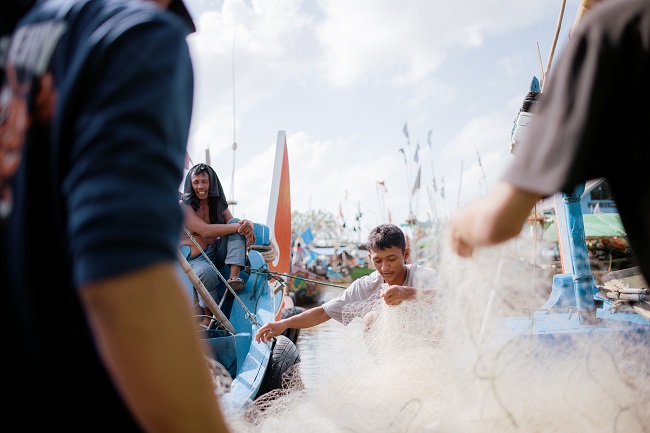
Sometimes boats need to be pulled out of the water for major maintenance, such as repainting. With time, mould and insects can penetrate the paint, especially on the deck. ‘The paint used on the deck and that used on the the hull are different types, in order to cut cost,’ said a local tradesman we met along the ride who had just finished repairing a large, eight-meter boat alone.
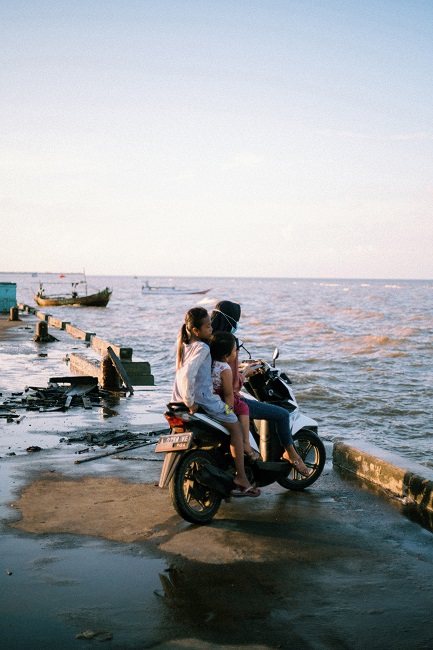
Witnessing the boat being put back into the water was also interesting. Utomo said that it was rare for visitors like me to get to see this process. People gathered around the boat on the riverbank as it was being prepared to sail again. A local shaman brought an offering of local foods and snacks, wrapped in banana leaves. The shaman prayed for the offering and put it on the deck. Then, a moment before the crowd was ready to push the boat, they swarmed the offering, claiming what they could.
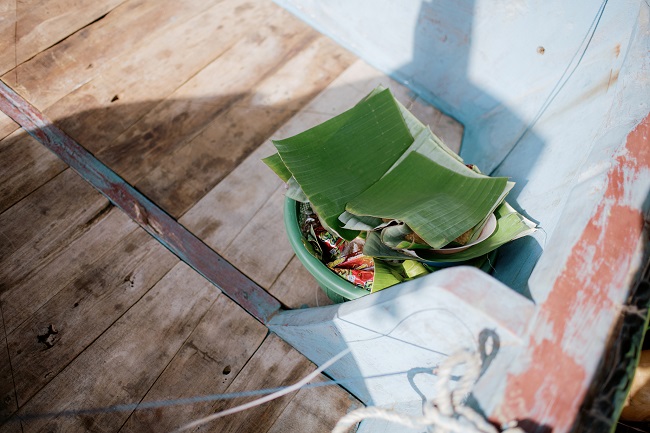
‘It’s a thank you gesture from the boat owner to the folks who are willing to help,’ explained Utomo. It was the local custom in Banyutowo to help each other out with this process. Anyone passing by the scene would volunteer to help.
As reported by local news media, a few years ago the Ministry of Marine Affairs and Fisheries proposed to designate Banyutowo as a National Fishing Village of Indonesia. If successful, it would be the first village in the country to gain the title, which would come with government-paid renovations of the local fishing facilities, mostly around the port. The recognition was proposed for the year 2020 but to this day there are no signs of its implementation.
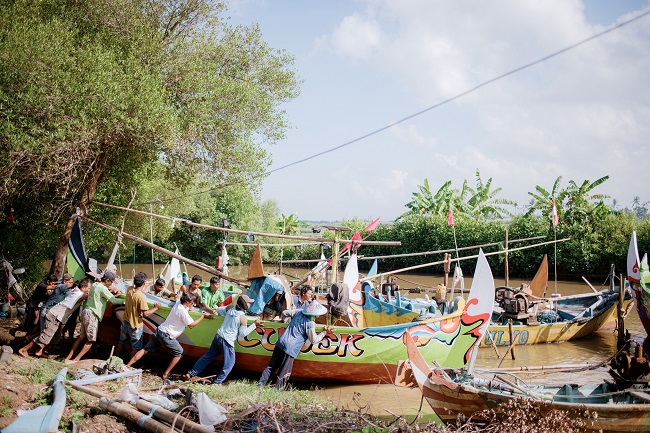
My visit to Banyutowo ended with my witnessing a scene of harmony as villagers hauled the boat into the river. I remember an Indonesian folk song from my childhood titled ‘My Ancestor is a Sailor’. Looking at the people here makes me believe that it wasn’t just a folk song.
Hutama Limarta is a photographer based in Jakarta. He loves to travel around the country looking for subjects to photograph. Twitter: @limartahutama Instagram: @hutamalimarta
